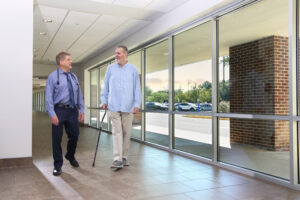By Oluseun A. Sowemimo, MD, FACS, FASMBS
Regardless of the number you see when you step on the scale, if you’re significantly overweight, you’re no more likely to become infected with the coronavirus than someone whose weight is well managed.
It’s what happens once you get the virus that makes a difference for people with obesity.
Impact of Obesity on COVID-19 Patients
With obesity, the body is often already in a chronic inflammatory state and suffering from co-morbid conditions like diabetes, heart disease, high cholesterol and sleep apnea.
According to a recent CDC report that examined COVID-19 patient data from January through May, for patients with underlying health conditions like these, “Hospitalizations were six times higher, ICU admissions [were] five times higher, and deaths [were] 12 times higher” when compared to patients without these conditions.
Obesity doesn’t just create more severe symptoms, though, it can also complicate the ability to safely treat the illness.
In particular, if you’re suffering from cardiovascular disease or pulmonary hypertension, narrowed blood vessels or existing damage to the lungs can decrease airway responsiveness to a ventilator, potentially complicating recovery. Hospital staff may also have more difficulty moving you to the prone position (on your stomach), a strategy that has been found to helped COVID-19 patients get more oxygen into their lungs.
Improve Your Health Naturally
While the lockdown has certainly created a more stressful environment that lends itself to eating more and making poor food choices, as restrictions begin to lift, you may be looking to develop healthier habits.
The most direct route to eating well is shifting from an animal-based diet to a plant-based diet. So, when restructuring your diet, look for more non-meat and non-processed options like:
- Food sources that are rich in antioxidants. Choose fruits like blueberries, strawberries, goji berries and raspberries or vegetables like kale, spinach or red cabbage.
- Seek out vitamin-boosting foods that contain calcium, Vitamin B12, Zinc, Potassium and Vitamin C, like cashews, garbanzo beans, oranges, peppers and bananas.
- Eat high-fiber foods like avocado, bran, lentils and chia seeds for beneficial gut bacteria that normalizes your bowel movements and helps clean out your system.
Overall, developing smarter, healthy eating habits pays off in dividends. Supplements may offer some benefits to giving your body the vitamins and minerals it is missing but taking a pill does not always work as well as getting them directly from the source. Plus, getting nutrients from food itself reinforces healthy eating practices.
In addition to changing your diet, adding exercise to your daily routine will go a long way to improving health. And with the longer summer sunlight hours, outside activity will also allow you to naturally soak in much-needed Vitamin D.
Surgical Weight Loss Options
When diet and exercise won’t get you to your weight loss goals or there are more imminent health issues at play, surgical options are also available.
The two most common surgical procedures for obesity today are the gastric sleeve and gastric bypass.
During a gastric sleeve procedure, the less-invasive of the two surgical options, the surgeon reduces the size of the stomach to about the size of a banana, removing excess stomach from the body.
Gastric bypass, on the other hand, makes physical changes to the anatomy of the stomach by creating a balloon-like pouch at the top of the stomach and reconnecting the bowel lower down on the gastrointestinal tract. Not only does this reduce the size of the stomach, it reduces hunger, increases metabolism and affects the body’s ability to absorb needed nutrients.
While many patients opt for the simpler gastric sleeve, gastric bypass is an even more effective solution in the fight against diabetes with an almost immediate improvement on blood sugar. It’s also extremely effective for those suffering from severe acid reflux.
It’s never too late to start losing weight and improving your overall health. Although it may not protect you from getting the coronavirus, it could help save your life in the long run.
Oluseun A. Sowemimo, MD, FACS, FASMBS is a board certified general surgeon and fellowship trained bariatric surgeon. He can be reached by calling 732-761-1740.





